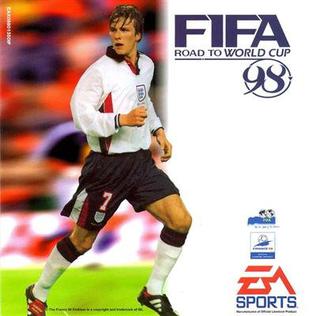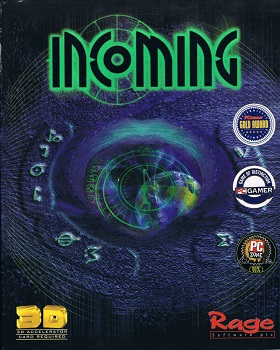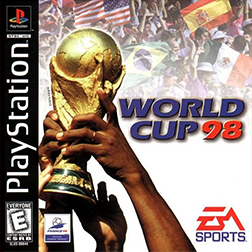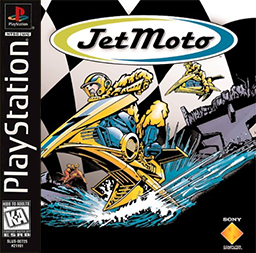
Midtown Madness is a 1999 racing game developed by Angel Studios and published by Microsoft for Microsoft Windows. The demo version was released in April 1999. Two sequels followed, with Midtown Madness 2 released in September 2000 and Midtown Madness 3 released in June 2003 for the Xbox. The game is set in Chicago; the object is for the player to win street races and obtain new cars.
Age of Empires is a series of historical real-time strategy video games, originally developed by Ensemble Studios and published by Xbox Game Studios. The first game was Age of Empires, released in 1997. Nine total games within the series have been released so far as of October 28, 2021.

FIFA 97 is a football simulation video game developed by EA Canada and published by Electronic Arts. It was released for PC on 24 June 1996 and versions for PlayStation, SNES, Mega Drive and Sega Saturn followed.

FIFA: Road to World Cup 98 is a football simulation video game developed by EA Canada and released by Electronic Arts in 1997. It is the fifth game in the FIFA series and the second to be in 3D on the fifth generation of video game consoles. A number of different players were featured on the cover, including David Beckham in the UK, Roy Lassiter in the United States, Mexico and Brazil, David Ginola in France, Raúl in Spain and Portugal, Paolo Maldini in Italy, and Andreas Möller in Germany. FIFA 98 was the last FIFA game released for the Sega Genesis, Sega Saturn and the Super Nintendo Entertainment System (SNES).

FIFA 2000 is a football simulation video game developed by EA Canada and published by Electronic Arts. It was the seventh game in the main FIFA series. The game was released for Microsoft Windows and PlayStation. A version for the Game Boy Color was developed by Tiertex Design Studios and published by THQ.

International Superstar Soccer Pro is a football video game developed by Konami Computer Entertainment Tokyo. It is a slightly improved version of the Japan-exclusive J-League Jikkyō Winning Eleven 97.

Incoming is a 3D shooter video game developed and published by Rage Software. The game was first released for Microsoft Windows in mid-1998, and was followed by a Dreamcast version, which was released in Japan on December 17, 1998, in Europe on October 14, 1999, and in North America on September 15, 1999. Set in the near-future of 2009, the game primarily revolves around controlling vehicles and turrets to fight alien invaders of Earth in one of the campaign modes, the arcade mode, and with or against another player. Some levels include brief real-time strategy segments.

Midtown Madness 2 is a 2000 open world racing video game for Microsoft Windows. It is the sequel to 1999's Midtown Madness, developed by Angel Studios and published by Microsoft. Unlike its predecessor, which is entirely set in Chicago, it features two open worlds in which to race, fictional representations of San Francisco, California and London, England. Players can choose from a variety of American and British vehicles including sports cars, buses and taxi cabs. The game has various modes of multiplayer connectivity, and included support for the now defunct MSN Gaming Zone. A sequel Midtown Madness 3 was released for Xbox in 2003.

Backyard Football is a series of video games for various systems. The series was developed by Humongous Entertainment and published by Infogrames, Atari, and The Evergreen Group. It is one of several sub-series in the Backyard Sports series, and is the first to feature professional players as kids, examples being Steve Young and Barry Sanders. The series currently has eleven titles.

Overboard! is a top-down adventure game, released by Psygnosis for the PlayStation and Microsoft Windows in 1997. It employs a light-hearted, all-ages piratical theme. A relatively low-key release for Psygnosis, the game was met with mixed reviews.

World Cup 98 is a football video game released in 1998 to coincide with that year's FIFA World Cup football tournament, developed by EA Canada and published by Electronic Arts under their EA Sports label. It is the first official FIFA World Cup game developed by EA Sports after obtaining the rights from FIFA in 1997. Unlike the previous World Cup games, which were in 2D and showed a bird's-eye view, World Cup 98 used a 3D engine, utilising DirectX for the PC version.

Backyard Soccer, known in Europe as Backyard Football (PC) or Junior Sports Football (PlayStation) and in Australia as Junior Sports Soccer, is a children's association football video game developed and published by Humongous Entertainment; Infogrames published the PlayStation version. It is the second game in the Backyard Sports series, following Backyard Baseball. It was first released on September 26, 1998, for Macintosh and Microsoft Windows, in 2001 for the PlayStation, and in 2008 for iOS. The PC and PlayStation versions of the game, alongside the PlayStation 2 version of Backyard Basketball, were the only Backyard Sports titles released in Europe.

Test Drive 4 is a racing game developed by Pitbull Syndicate and published by Accolade for PlayStation and Microsoft Windows in 1997. It offers 14 supercars and muscle cars, and tasks the player with beating computer opponents in tracks set in real life locales. The game's tracks are long courses with rural roads and urban streets, and commonly feature traffic and short corners. The player has to arrive at each checkpoint before the Checkpoint Timer expires, resulting in additional time, and crossing the finish line is required to complete the race. Test Drive 4's commercial success briefly made Test Drive the best selling racing franchise, but the game received mixed reviews. In 1999 the game was republished under the Greatest Hits label after selling 850,000 copies within one year of its release.

The Legendary Axe is a horizontal platform video game for the TurboGrafx-16. It was developed and published by Victor Musical Industries in Japan and by NEC in North America. It was released in Japan on September 23, 1988 and in North America as a TurboGrafx-16 launch title on August 29, 1989. In the game, the player controls Gogan, a barbarian whose girl, Flare, was kidnapped by the cult of Jagu. The player must navigate through six platforming levels, armed with a legendary axe named "Sting" to defeat Jagu and his minions and rescue Flare. The game features a rechargeable "strength meter" that determines how much damage is dealt from the axe to enemies.

Jet Moto is a 1996 racing video game developed by SingleTrac and published by Sony Computer Entertainment for the PlayStation video game console and PC. The PlayStation version was released in North America on October 31, 1996; in 1997 for Europe in February and Japan on August 7. The PC version was released on November 13, 1997. Jet Moto was made available for the PlayStation Portable and PlayStation 3 via the PlayStation Network in February 2007. Developers chose fictional hovering bikes instead of wheeled motorcycles initially to resolve performance concerns. Other performance concerns led the team to develop two different physics systems—one for the player, and one for the 19 computer racers.

UEFA Euro 2004 is the official licensed video game of UEFA Euro 2004 football tournament hosted in Portugal. The game was developed by EA Canada and published by EA Sports. It was released for Microsoft Windows, Xbox and PlayStation 2.

NFL Quarterback Club 97 is an American football video game released in 1996. The game was released on the PlayStation, Sega Saturn, and DOS systems. The game was also released in Japan on the Saturn. The game's cover features former Miami Dolphins quarterback Dan Marino.

UEFA Euro 2000 is the official game of UEFA Euro 2000 football tournament hosted in Belgium and the Netherlands. The game was published by EA Sports and developed by EA Canada. It is available for PC and PlayStation.

Viva Football is an association football video game released for the PlayStation and Windows. It was developed by Crimson Studio and published by Virgin Interactive.

FIFA 2001 is a football simulation video game and the sequel to FIFA 2000. It was succeeded by FIFA Football 2002. It features Paul Scholes on the UK cover and Ben Olsen on the North American cover. The game's Spanish cover features Gaizka Mendieta on it. It was released on 31 October 2000 for Microsoft Windows and PlayStation, and on 24 November 2000 for PlayStation 2 as a launch title in Europe. The PlayStation 2 version was originally slated for release in the U.S. on 7 November, before it was delayed to 28 November. A Game Boy Color version was planned but cancelled.


















